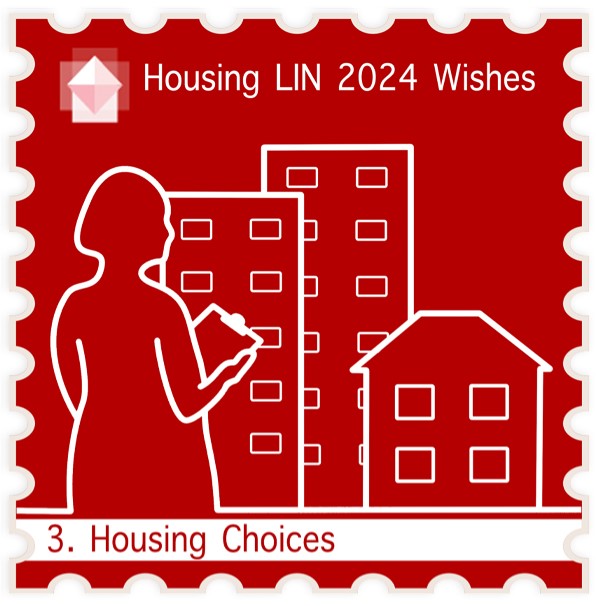Our top 5 wishes for 2024

A very Happy New Year from all of us at the Housing LIN. We hope you had a good festive period.
We kick off with our top 5 wishes for specialist and supported housing and the technology-enabled care and housing sectors in this election year. They are:
No1. Adopting Part M4(2) in Building Regulations
 The Housing LIN is a long-term champion of the Lifetime Homes Standards and the HAPPI design principles. We are also founding members of the HoME (Housing Made for Everyone Coalition) (opens new window) and following the government's accessibility consultation, call on it to amend the building regulations and reintroduce Part M4(2) as a minimum without further delay. This will ensure that all new residential dwellings are built to improve accessible housing design. As part of their deliberations, we urge the Older People's Housing Taskforce to press for this change.
The Housing LIN is a long-term champion of the Lifetime Homes Standards and the HAPPI design principles. We are also founding members of the HoME (Housing Made for Everyone Coalition) (opens new window) and following the government's accessibility consultation, call on it to amend the building regulations and reintroduce Part M4(2) as a minimum without further delay. This will ensure that all new residential dwellings are built to improve accessible housing design. As part of their deliberations, we urge the Older People's Housing Taskforce to press for this change.
Find out more about designing accessible housing, including HAPPI, on our dedicated 'Design Hub'.
No2. Eradicating digital exclusion
 Housing LIN supported market research and our pioneering work coproducing the TAPPI principles shows that the specialist and supported housing operators are largely unprepared for the digital switchover which comes into effect at the end of next year.
Housing LIN supported market research and our pioneering work coproducing the TAPPI principles shows that the specialist and supported housing operators are largely unprepared for the digital switchover which comes into effect at the end of next year.
The sector urgently needs to prioritise being 'digi-ready' in its operational delivery plans and get switched on to the digital switchover. This must ensure that all residents and customers in receipt of technology-enabled care or housing are not digitally excluded, can remain connected to their social networks and, more importantly, maintain the continuity of any vital at-home care and support for independent living.
For more about the digital switchover, smart housing and technology, including TAPPI, visit our dedicated 'TECH' webpages.
No3. Big Data: Better analytics for localised specialist/supported housing choices
 Recent Housing LIN analysis indicates that there is a significant shortfall of specialist/supported housing. And, as outlined in the Supported Housing (Regulatory Oversight) Act, local authorities are under an obligation to develop strategic supported housing plans quantifying existing supply and local needs.
Recent Housing LIN analysis indicates that there is a significant shortfall of specialist/supported housing. And, as outlined in the Supported Housing (Regulatory Oversight) Act, local authorities are under an obligation to develop strategic supported housing plans quantifying existing supply and local needs.
Coupled with the publication last month of the updated National Planning Policy Framework, we want to see better assessments of local housing needs in every council area and the use of this data to inform planning for the provision of a range of accommodation choices for older people, people with a learning disability and autistic people that support independent living.
For more about undertaking strategic housing market assessments, visit our dedicated SHOP@ webpages.
No4. Investing in our future specialist/supported housing
 With sector housebuilding at a low we need a 'Marshall Plan' to fund a new wave of age-friendly homes across all tenures: from purpose-built special housing to mainstream housing that can accommodate our changing needs as we age.
With sector housebuilding at a low we need a 'Marshall Plan' to fund a new wave of age-friendly homes across all tenures: from purpose-built special housing to mainstream housing that can accommodate our changing needs as we age.
Drawing on better data, we call on government to both increase the allocations set aside for specialist/supported housing in its capital funding programmes for affordable housing and implement measures that will create the conditions for further inward investment so that at least 10% of all new homes built to meet government's overall 2024 housing targets are for specialist provision.
For more about capital funding for specialist housing, visit our Funding Matters - Capital Funding webpages.
No5. Think age-friendly places
 In recent weeks, both the Greater London Authority (opens new window) and Manchester City Council (opens new window) have published their age-friendly plans. These recognise the impact of an ageing population and set out key actions to make their cities age-friendly.
In recent weeks, both the Greater London Authority (opens new window) and Manchester City Council (opens new window) have published their age-friendly plans. These recognise the impact of an ageing population and set out key actions to make their cities age-friendly.
It’s also over 15 years since the government published Lifetime Homes, Lifetime Neighbourhoods. Drawing on this seminal publication and growing examples of age-friendly communities, we call for the creation of lifetime neighbourhood standards so every locality can embrace inclusive neighbourhoods where the built environment is accessible to all.
For more about age-friendly communities, visit our Age-friendly Communities and Lifetime Neighbourhoods webpages.
